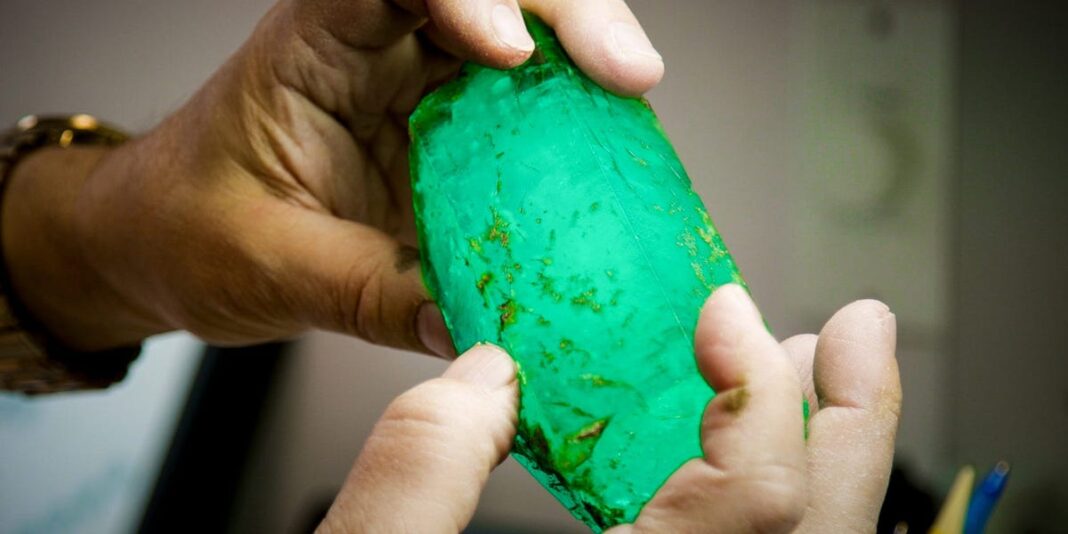In the Heart of Colombia’s Emerald Empire: The Unseen Struggle for a Billion-Dollar Industry
Colombia, a nation of breathtaking beauty and untold riches, is home to one of the world’s most valuable and coveted natural resources: the emerald. For centuries, the emerald has been a prized commodity, coveted by royalty, billionaires, and connoisseurs alike. But beneath the glitz and glamour of the emerald trade lies a complex web of politics, power struggles, and economic uncertainty. The $150 million emerald industry in Colombia is a behemoth that spans generations, involving ruthless business deals, compromised politicians, and a web of embezzlement and corruption.

The Billion-Dollar Question: Who Owns Colombia’s Emerald Industry?

Colombia’s emerald industry, valued at a staggering $150 million, has long been a source of fascination and conflict. For centuries, miners have fought over these precious stones, but in the past decade, foreign investors have modernized and consolidated the industry. The question on everyone’s mind is: who owns Colombia’s emerald industry, and what are the implications for local miners and communities?
The Rise of Foreign Investors
The influx of foreign investors has brought significant changes to the emerald industry in Colombia. With their advanced technology and capital, foreign companies have modernized the mining process, increasing efficiency and productivity. However, this modernization has come at a cost. Local miners have struggled to adapt to the new methods, and many have been pushed out of the industry.
A significant impact of foreign investment has been on mining safety. With their emphasis on safety protocols and regulations, foreign companies have reduced the risk of accidents and improved working conditions. However, this has also led to the displacement of local miners who are not trained in these new safety protocols.
Foreign investment has also created new job opportunities, but these have largely benefited foreign workers rather than locals. According to a report by the Colombian government, foreign companies have created over 5,000 jobs in the emerald industry, but only 20% of these jobs have gone to local workers.
The Community Left Behind
Despite the growth of the emerald industry, local communities surrounding the mines have seen limited benefits. Many communities have been displaced to make way for mining operations, and those that remain have seen little economic benefit.
Local miners have struggled to gain a foothold in the industry, as foreign companies have consolidated their power and influence. Many have been forced to work in dangerous conditions, with minimal pay and no benefits.
The lack of benefits for local communities is particularly striking, given the significant revenue generated by the emerald industry. According to Unionjournalism, the industry generates over $150 million in revenue each year, but only a small fraction of this goes back to the local communities.
A Fight for Share of the Spoils
As foreign investors continue to dominate the emerald industry, local miners are fighting back to reclaim their place in the industry. This fight is not just about economics; it’s also about cultural identity and tradition.
Local Miners’ Efforts
Local miners have been organizing to reclaim their place in the industry. They are demanding greater recognition of their traditional mining practices and skills, and seeking a greater share of the revenue generated by the industry.
One initiative is the formation of cooperatives, where local miners can pool their resources and work together to compete with foreign companies. These cooperatives have been successful in some areas, but they face significant challenges in competing with the capital and technology of foreign investors.
The Challenges of Competing
Competing with foreign investors is a daunting task for local miners. Foreign companies have the advantage of advanced technology, capital, and expertise, making it difficult for local miners to compete.
Additionally, foreign companies have been accused of exploiting local labor and resources, further exacerbating the challenges faced by local miners.
Despite these challenges, local miners remain determined to reclaim their place in the industry. They are seeking support from the government, NGOs, and other organizations to promote sustainable and inclusive mining practices.
Conclusion
The Emerald Industry in Colombia: A Battleground for Power and Profit
As we conclude our exploration of the $150 million emerald industry in Colombia, it’s clear that the fight for control and dominance has been raging for years. The article highlights the struggles of small-scale miners, who face exploitation and intimidation by powerful Cartels and government officials. The Colombian government’s efforts to regulate the industry and protect miners’ rights have been met with resistance, as Cartels seek to maintain their grip on the market. Meanwhile, international buyers and traders navigate the complex web of corruption and violence, often unaware of the human cost of their purchases.
The significance of this industry cannot be overstated, as emeralds are not only a valuable commodity but also a symbol of Colombia’s rich cultural heritage. The fight for control of the emerald industry has implications for human rights, economic development, and the country’s reputation on the global stage. As the industry continues to evolve, it’s essential to consider the long-term consequences of the current power dynamics. Will the Colombian government succeed in establishing a more equitable and transparent industry, or will the interests of powerful Cartels prevail?
As we look to the future, one thing is clear: the emerald industry in Colombia will continue to be a battleground for power and profit. However, it’s time for the international community to take a stand and demand greater accountability and transparency in the industry. By supporting small-scale miners and promoting fair trade practices, we can help create a more just and sustainable future for all stakeholders involved. The emeralds of Colombia are not just a treasure trove of wealth, but a symbol of hope and resilience in the face of adversity. It’s time to choose which path we’ll take – one of exploitation and greed, or one of equality and justice. The choice is ours.
